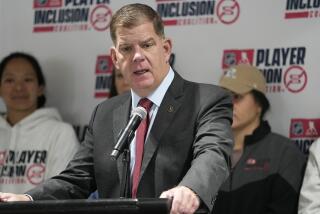NHL Season Is Closer to Point of No Return
- Share via
Endgame is near for the NHL and the players’ association.
Four hours of fruitless talks in Toronto on Thursday pushed the league closer to its self-imposed deadline of Monday for having a labor deal on paper or canceling the season. No meetings are planned, and each side said it won’t call the other.
Thursday’s session was “pointless,” Bill Daly, the NHL’s chief legal counsel said during a conference call with reporters, adding that Wednesday’s imposition of a “drop-dead” date hadn’t spurred the union to compromise.
“They continued to be just as inflexible today as they were 6 1/2 years ago when we started talking about the problems that this sport faces,” Daly said before he and Commissioner Gary Bettman returned to their New York offices. “At this point, we’re out of tricks.”
Ted Saskin, the NHLPA’s senior director, said the union made major concessions in agreeing to a 24% salary rollback, revenue sharing, and the imposition of luxury taxes, and he characterized the NHL as unbending for its insistence on a salary cap and linking salaries to revenues.
Saskin also reiterated the union’s opposition to a system the league suggested Wednesday. That plan would have initially adopted the union’s tax and rollback but would have switched to the NHL’s salary cap-based plan when clubs hit any of several easily reached payroll figures.
“We made it pretty clear today that we always remain prepared to sit in a room and try to work things out and have a negotiation ... but we have yet to find a negotiating partner,” Saskin said. “They’ve been of a single mind, single track, and that has not allowed us to make any progress, and frankly we fail to see at this late date how that’s going to change.”
Responding to suggestions that Bob Goodenow, the union’s executive director, might wait until the last second to present his best offer, Saskin said Goodenow wasn’t “deadline-hunting” and that there’s “absolutely no offer” coming from the union. The proposal the NHLPA made on Dec. 9, which included the rollback and luxury tax was “extraordinary,” he said, and was delivered well before time grew short to salvage this season.
A source familiar with the negotiations said “It’s over. The league won’t give up linkage. It won’t give up the cap. It’s over.”
After meeting for the second successive day, Daly said the talks had a “higher level of agitation” than previous gatherings. “I think that had to do with, quite frankly, we expected a little more from the players’ association than we got,” he said. “To be generous, we got nothing. We didn’t get any concepts, we didn’t get any discussions of new ideas, we got nothing.”
Said Saskin: “Agitated? I don’t know that there was agitation from our point of view. They seem to be agitated when we’re not giving them more concessions.
“We don’t think a cap is the only way to reduce player costs in a meaningful and reliable way. There are a number of other ways to do it and we’ve suggested several. It’s incumbent for the parties to approach this issue with a more flexible approach to find something that can work for both sides and not pick as their one issue the one thing that can’t lead to any progress.”
Two new elements did appear among the familiar rhetoric.
Daly said two mediators from the Federal Mediation and Conciliation Service had worked with the parties as recently as last week. Daly said the mediators offered compromise proposals to each side, separately and together, but didn’t get far.
“They made a determination that in this type of negotiation, where there’s a single issue where the parties aren’t in the same sphere, they didn’t see how they could assist the process in reaching a resolution,” Daly said.
Also new on Thursday was the NHL’s presentation of a revenue-sharing concept. However, it wasn’t discussed at length. “There wasn’t a lot to it,” Saskin said, “and they had difficulty answering some of the questions we were raising.”
Jeff Friesen of the New Jersey Devils said he still hoped the season will be saved.
“I don’t want hockey to have the label being the first sport to cancel a season. That will make it tough to win back the fans,” he said. “We feel that we have made a pitch in negotiations that, from our perspective, was fair. I think they’re trying to hit a home run with this hard cap.”
Former Mighty Duck Teemu Selanne, now a free agent, said that owners should be able to operate within budgets without a salary cap.
“I think all the players feel we already have a salary cap. You can’t spend more money than you have,” he said. “This is the owners’ problem and no one knows who is losing money, but some teams are. It’s like any other business. If you’re spending more than you’re making you have a problem.”
More to Read
Go beyond the scoreboard
Get the latest on L.A.'s teams in the daily Sports Report newsletter.
You may occasionally receive promotional content from the Los Angeles Times.








